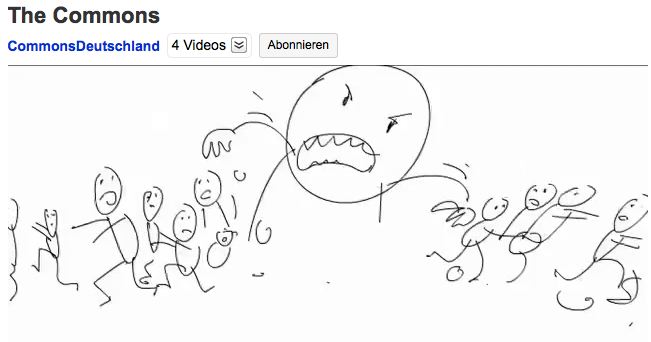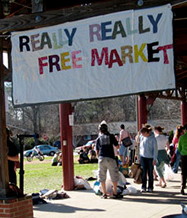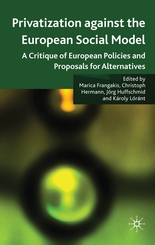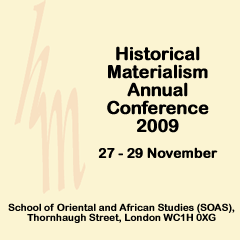Privatizing Greece
The Question: Is the sale of the Greek family silver a long-term solution? is to be answered: No!
But what else to do? The answer is found around the corner: A wage raise in Germany.
The Question: Is the sale of the Greek family silver a long-term solution? is to be answered: No!
But what else to do? The answer is found around the corner: A wage raise in Germany.
When community garden activists of the 1970s and early 1980s clandestinely planted tomatoes, cucumber and sunflowers in abandoned backyards and on run-down lots, they probably never imagined that a time would come when city administrations would embrace urban gardening as an important “cultural, ecological and social resource”.1 Many of today’s community gardens in North America and Europe started out as squats or informal “guerilla style” gardens and were influenced by, if not a substantial part of urban social and environmental movements of the 1960s and 1970s.2
Read more | ›››
The current issue of new formations contains an interesting article on “the future of the commons”:
The ‘commons’ has undergone a remarkable transformation in the last fifteen years, from a word referring rather archaically to a grassy square in the centre of New England towns to one variously used by real estate developers, ‘free software’ programmers, ecological activists and peasant revolutionaries to describe very different, indeed conflicting, purposes and realities. I believe that this resurgence of ‘commons’ thinking is due to a confluence of two streams coming from opposing perspectives.
 Diaspora is an open-source Facebook alternative. The idea got so much buzz on the crowdsourced micro-funding site Kickstarter, that they were able to turn a goal of raising $10,000 in 39 days into $200,000 from 6,500 backers in the same timeframe. But with such high expectations, you have to deliver. And many expressed doubts that the small team of college students could do that. Read more
Diaspora is an open-source Facebook alternative. The idea got so much buzz on the crowdsourced micro-funding site Kickstarter, that they were able to turn a goal of raising $10,000 in 39 days into $200,000 from 6,500 backers in the same timeframe. But with such high expectations, you have to deliver. And many expressed doubts that the small team of college students could do that. Read more
 The animated video clip titled “The Commons” provides a short introduction into the idea of the commons, as well as a critical review of the so called “tragedy of the commons”.
The animated video clip titled “The Commons” provides a short introduction into the idea of the commons, as well as a critical review of the so called “tragedy of the commons”.
 The International Commons Conference connected about 150 leading figures in commons-based studies and activism for a multidisciplinary, international conference in Berlin, Heinrich Böll Foundation. The general objective was to emerge with a set of principles and long-term goals that can foster the planning and development of commons based organisations and policy as well as their networking capacity. Read more about the outcomes of the conference.
The International Commons Conference connected about 150 leading figures in commons-based studies and activism for a multidisciplinary, international conference in Berlin, Heinrich Böll Foundation. The general objective was to emerge with a set of principles and long-term goals that can foster the planning and development of commons based organisations and policy as well as their networking capacity. Read more about the outcomes of the conference.
See also: Workshop report: Commoning through the Crisis: creating commons power and resisting enclosures and cooptation
In the subway, there’s no longer any trace of the screen of embarrassment that normally impedes the gestures of the passengers. Strangers make conversation without making passes. A band of comrades conferring on a street corner. Much larger assemblies on the boulevards, absorbed in discussions. Surprise attacks mounted in city after city, day after day. A new military barracks has been sacked and burned to the ground. The evicted residents of a building have stopped negotiating with the mayor’s office; they settle in. A company manager is inspired to blow away a handful of his colleagues in the middle of a meeting. There’s been a leak of files containing the personal addresses of all the cops, together with those of prison officials, causing an unprecedented wave of sudden relocations. We carry our surplus goods into the old village bar and grocery store, and take what we lack. Some of us stay long enough to discuss the general situation and figure out the hardware we need for the machine shop. The radio keeps the insurgents informed of the retreat of the government forces. A rocket has just breached a wall of the Clairvaux prison. Impossible to say if it has been months or years since the “events” began. And the prime minister seems very alone in his appeals for calm. Read more
Read more | ›››
 After several decades of relentless neoliberal enclosures, the idea of ‘commons’ is enjoying a renaissance amongst some neo-Keynesian economists and commentators, while political scientist Elinor Ostrom has just been award the Nobel prize ‘for her analysis of economic governance, especially the commons’. Massimo De Angelis explains why capital’s commons will always be distorted – because they are based upon social injustice – and why we can only reclaim the commons from capital by constructing common interests. Read more about the tragedy of the capitalist commons
After several decades of relentless neoliberal enclosures, the idea of ‘commons’ is enjoying a renaissance amongst some neo-Keynesian economists and commentators, while political scientist Elinor Ostrom has just been award the Nobel prize ‘for her analysis of economic governance, especially the commons’. Massimo De Angelis explains why capital’s commons will always be distorted – because they are based upon social injustice – and why we can only reclaim the commons from capital by constructing common interests. Read more about the tragedy of the capitalist commons
If the cell form of capitalism is the commodity, the cellular form of a society beyond capital is the common. Nick Dyer-Witheford discusses the circulation of commons and the conditions they would create for new collective projects and waves of organising. Read more about Commonism
 According to the capitalist lexicon, the “Free Market” is the economic system in which prices are determined by unrestricted competition between privately owned businesses. Any sensible person can recognize immediately that neither human beings nor resources are free in such a system; hence, a “Really Really Free Market” is a market that operates according to gift economics, in which nothing is for sale and the only rule is share and share alike. In the interest of not taxing the reader’s patience, a single apostrophe stands in for the two “Really”s throughout this text. Read more
According to the capitalist lexicon, the “Free Market” is the economic system in which prices are determined by unrestricted competition between privately owned businesses. Any sensible person can recognize immediately that neither human beings nor resources are free in such a system; hence, a “Really Really Free Market” is a market that operates according to gift economics, in which nothing is for sale and the only rule is share and share alike. In the interest of not taxing the reader’s patience, a single apostrophe stands in for the two “Really”s throughout this text. Read more
 There are no more conferences. The final product of the CA PRESOM is the book: Privatisation against the European Social Model – A critique of European policies and proposals for alternatives, Palgrave Macmillan, Houndmills, Basingstoke, UK, November 2009.
There are no more conferences. The final product of the CA PRESOM is the book: Privatisation against the European Social Model – A critique of European policies and proposals for alternatives, Palgrave Macmillan, Houndmills, Basingstoke, UK, November 2009.
Feral Trade is a public experiment trading goods over social networks. The use of the word ‘feral’ describes a process which is wilfully wild (as in pigeon) as opposed to romantically or nature-wild (wolf). The passage of goods can open up wormholes between diverse social settings, routes along which other information, techniques or individuals can potentially travel. Read more
Prokla (Probleme des Klassenkampfes/problems of class struggle), one of the leading and long standing unorthodox Marxist journals in Germany, is now available from the internet. The older issues from 1971 to 2006 are even freely accessible. Of course Prokla as all left journals is dependent on subscriptions. Check out www.prokla.de
 The »Creative Industries« are considered key to the city development in the 21st Century. Cities such as Berlin put them at the center of image and location policy. The debates are mainly of benefit to the economy and capital development at the forefront – the changed living and working conditions of creative people are in contrast scarcely taken into view. They will be the topic of the congress. The digital revolution in production and distribution, the struggles for intellectual property and realization rights, more flexible corporate structures and labour relations, the project form of work and the privatization of cultural institutions have changed jobs and lifestyles as subjectivities. An unwieldy number of opportunities face enormous competition for jobs and contracts, increased chances of expression the pressure of conformity by the market, more self-determination the self-exploitation in informal and precarious employment relationships and with unfettered income at the same time. Read more
The »Creative Industries« are considered key to the city development in the 21st Century. Cities such as Berlin put them at the center of image and location policy. The debates are mainly of benefit to the economy and capital development at the forefront – the changed living and working conditions of creative people are in contrast scarcely taken into view. They will be the topic of the congress. The digital revolution in production and distribution, the struggles for intellectual property and realization rights, more flexible corporate structures and labour relations, the project form of work and the privatization of cultural institutions have changed jobs and lifestyles as subjectivities. An unwieldy number of opportunities face enormous competition for jobs and contracts, increased chances of expression the pressure of conformity by the market, more self-determination the self-exploitation in informal and precarious employment relationships and with unfettered income at the same time. Read more

State projects between neoliberal restauration and ‘postneoliberalism’
(ppg-network and RLS in cooperation with the University of Vienna and Historical Materialism) at Historical Materialism in London, 27.-29.11.09, School of Oriental and African Studies (SOAS), Thornhaugh Street, London WC1H OXG.
Read more | ›››